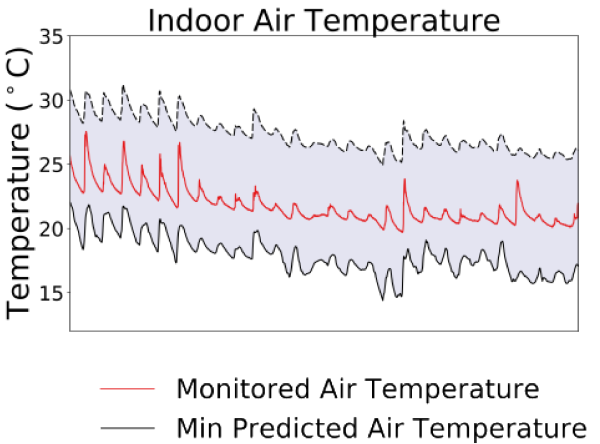Better prediction of overheating in new homes
A detailed study of three modern, energy-efficient flats has been carried out to improve the means of predicting indoor temperatures and the risk of overheating, when designing multi-residential buildings.
Overheating in modern homes – which are often designed with a focus on improving energy efficiency – is a growing problem and likely to be exacerbated by climate change. To counter this, it is important when designing buildings to reliably assess indoor temperatures and the potential for overheating. These are typically predicted with dynamic simulations, using Building Performance Simulation (BPS) tools.
BPS tools need accurate data on a complex range of issues in the areas of climate, site context, building fabric, building services and occupant behaviour. All of these bring high levels of uncertainty that make correctly predicting indoor temperature very difficult, and can lead to a gap between the expected and actual performance.
A BRE Trust supported PhD project has been conducted by Kostas Mourkos at Loughborough University, to improve BPS tools’ reliability when predicting overheating risks in homes in multi-residential buildings. This was achieved by studying in detail three modern energy-efficient flats located in London. The flats are representative of many high-density developments built in London in recent years.
Areas of overheating assessments that have been revealed as needing improvement by the analysis include:
- Specifying input values for parameters, such as the ventilation rates of mechanical ventilation systems.
- Providing guidance on handling the thermal interaction between communal spaces and the assessed flat.
- Examining different infiltration and exfiltration pathways.
The analysis also identified the key parameters influencing the observed gap between predicted and monitored indoor air temperature. While demonstrating how such a gap can be efficiently bridged through Bayesian calibration, this research showed that predicting overheating accurately remains challenging.
The research recommended that an overheating assessment should incorporate sources of uncertainty (such as occupant behaviour), by providing a range of values – instead of a single value – of the desired Building Performance Indicator (BPI). It should also consider using less sensitive overheating metrics.
Kostas was supervised by Prof Christina Hopfe and Dr Rob McLeod at Graz University of Technology, Dr Chris Goodier at Loughborough University, and Dr Mick Swainson at BRE. For more information contact Kostas (k.mourkos@lboro.ac.uk) or access the paper.
[edit] Related articles on Designing Buildings Wiki
- BRE articles.
- BRE Trust.
- Building Research Establishment.
- Heat stress.
- Home Quality Mark high temperature reporting tool.
- Human comfort in buildings.
- Overheating - assessment protocol.
- Overheating in residential properties.
- Overheating.
- Preventing overheating.
- Solar gain.
- Thermal comfort.
- Thermal indices.
- Thermal pleasure in the built environment.
Featured articles and news
Infrastructure that connect the physical and digital domains.
Harnessing robotics and AI in challenging environments
The key to nuclear decommissioning and fusion engineering.
BSRIA announces Lisa Ashworth as new CEO
Tasked with furthering BSRIA’s impressive growth ambitions.
Public buildings get half a million energy efficiency boost
£557 million to switch to cleaner heating and save on energy.
CIOB launches pre-election manifesto
Outlining potential future policies for the next government.
Grenfell Tower Inquiry announcement
Phase 2 hearings come to a close and the final report due in September.
Progress from Parts L, F and O: A whitepaper, one year on.
A replicated study to understand the opinion of practitioners.
ECA announces new president 2024
Electrical engineer and business leader Stuart Smith.
A distinct type of countryside that should be celebrated.
Should Part O be extended to existing buildings?
EAC brands heatwave adaptation a missed opportunity.
Definition of Statutory in workplace and facilities management
Established by IWFM, BESA, CIBSE and BSRIA.
Tackling the transition from traditional heating systems
59% lack the necessary information and confidence to switch.
The general election and the construction industry
As PM, Rishi Sunak announces July 4 date for an election.
Eco apprenticeships continue help grow green workforce
A year after being recognised at the King's coronation.
Permitted development rights for agricultural buildings
The changes coming into effect as of May 21, 2024.























